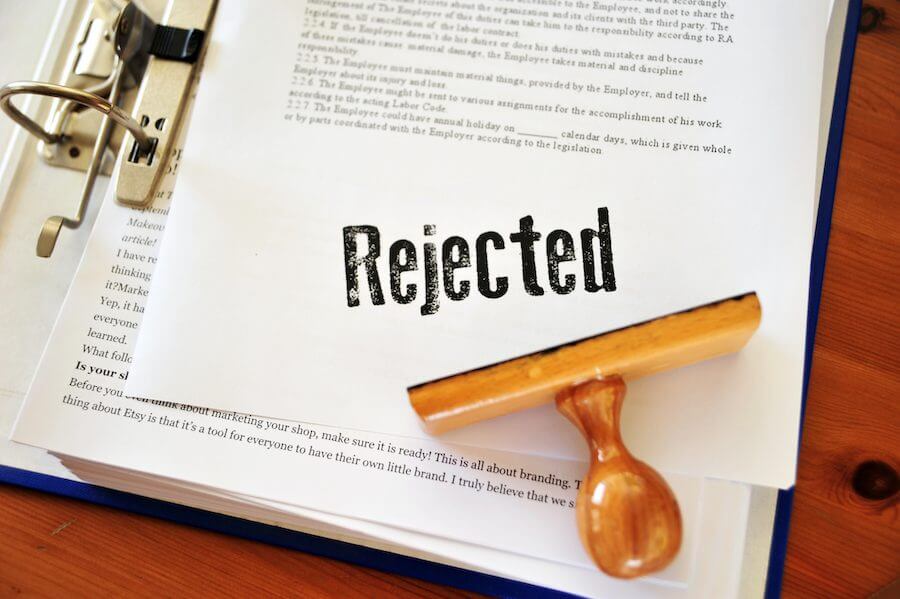A grant is something, usually money, that is given to a person or entity free of charge and for a particular course. They are usually issued by large corporate entities, government agencies, philanthropists, and charitable institutions. An organization must send out rejection letters to those who did not qualify for the grants.
The following are the top reasons why this is vital:
Vouch for the Integrity of the Assessment Process
Sending out such a letter is proof that the assessment process was free and fair. Those who receive such letters will be satisfied with the entire process. That is because they will be convinced that each applicant was scrutinized and appropriately evaluated.
Preserve Present Ties
Rejection of an application ought not to put an end to existing relationships and ties. It is only by drafting a polite rejection letter that such ties may be upheld.
Uphold the Image of the Organization
The image of the organization also gets preserved in the process. Those who transact any business with the organization will take it seriously going forward. A good image is important for any future dealings that heavily rely on transparency.
Grant Rejection Letter Templates
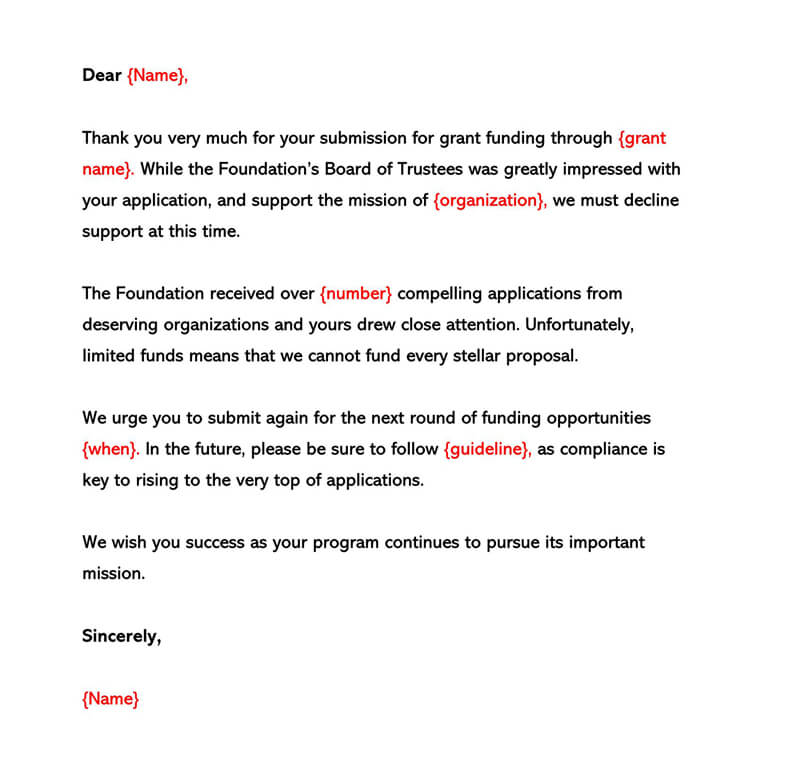

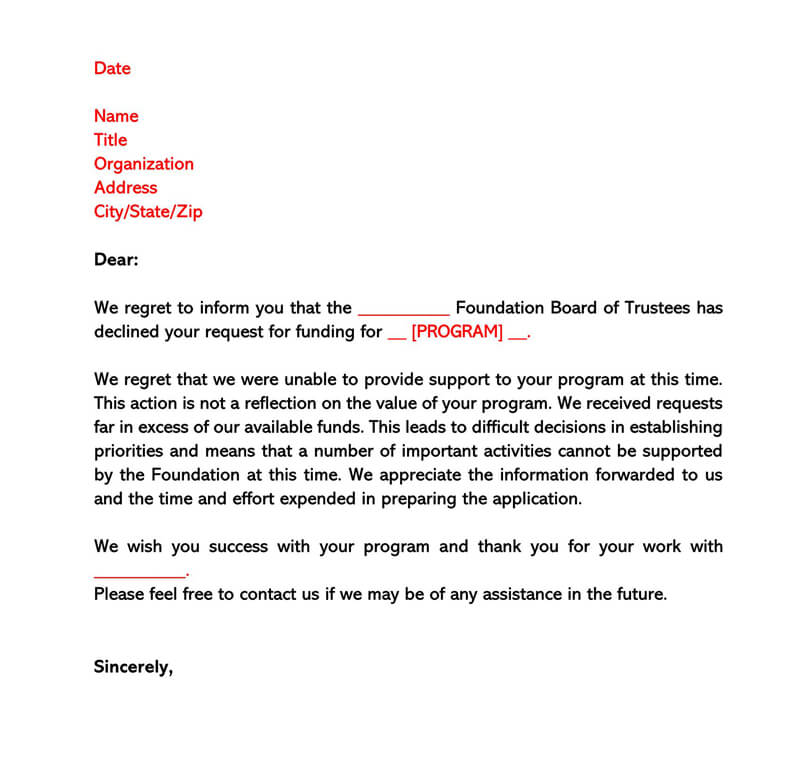
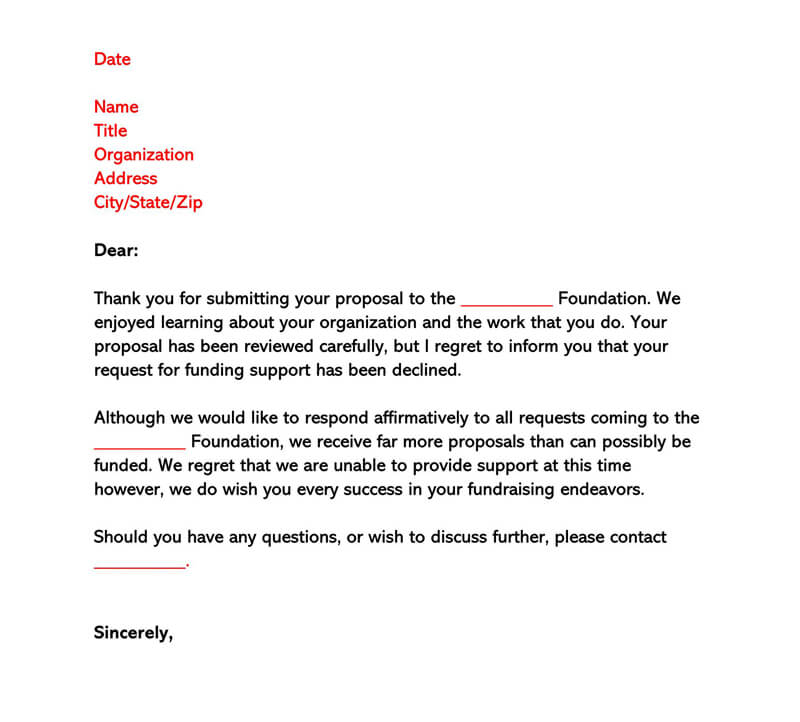
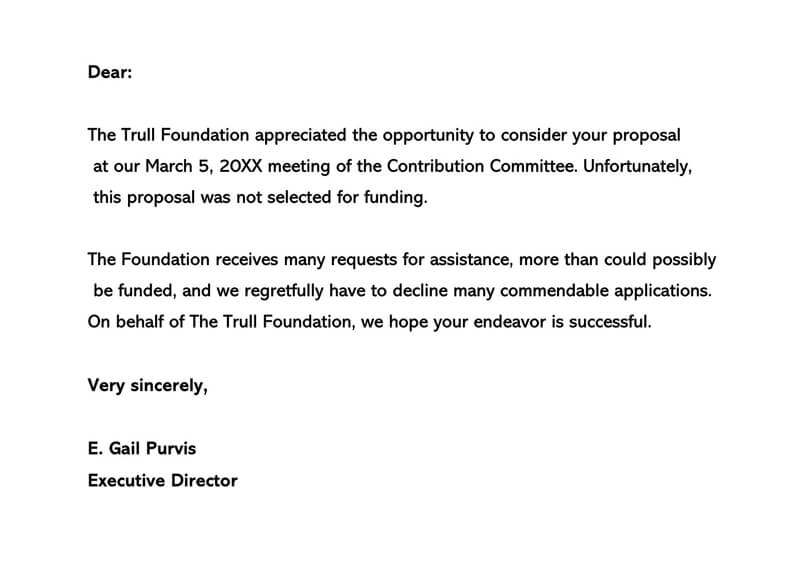
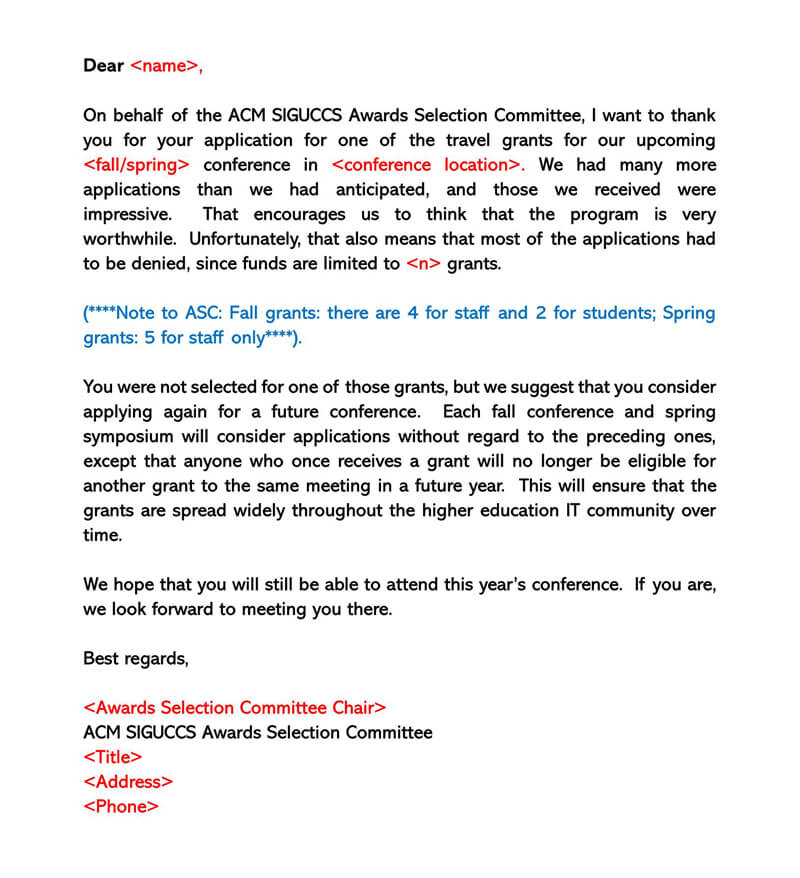
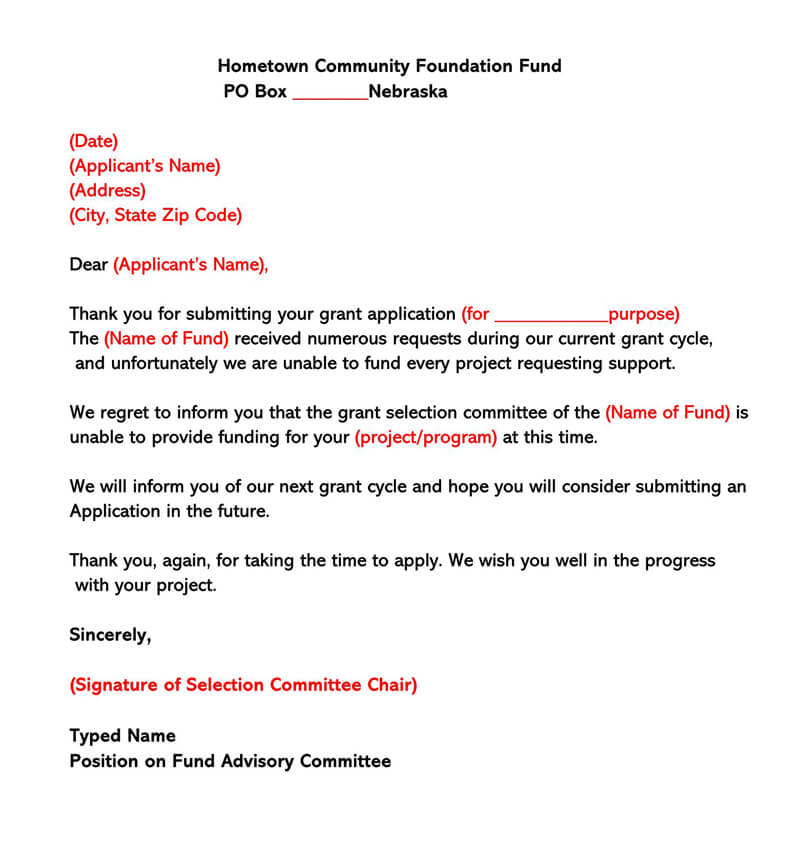

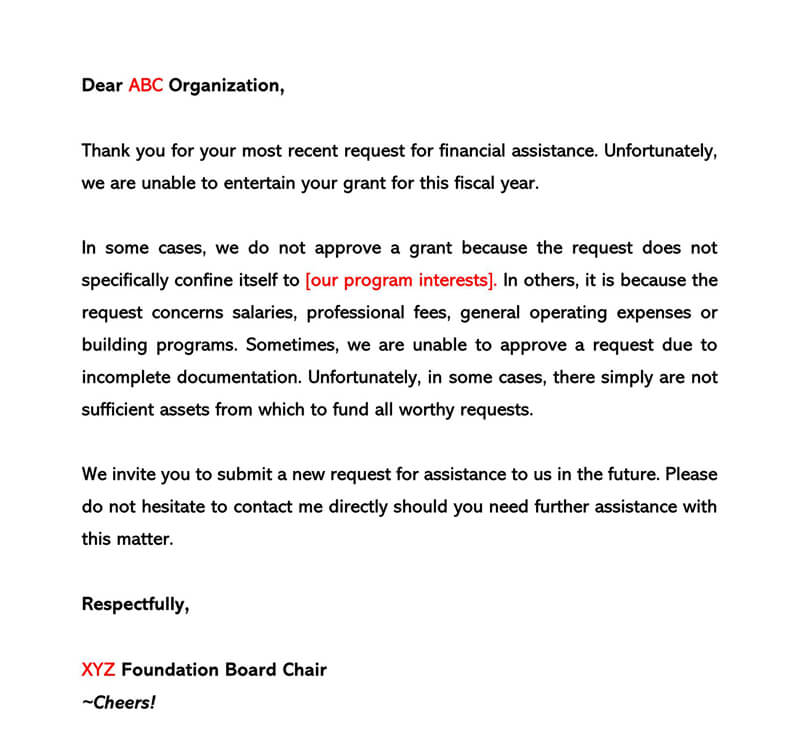
What Types of Applicants Apply for a Grant?
Start-up entrepreneurs
Those who have new ideas and want to actualize them may also apply for these grants. In this sense, they will often have to surrender part of the ownership of the ventures they engage in. Needless to say, such kinds of grants are given under strict rules and guidelines.
Venture capitalists
Venture capitalists are investors who pump their money into companies, usually start-ups, in exchange for a stake in those companies. To receive this money, they, in turn, apply to larger financiers like banks, mutual funds, and stock markets.
Students
Students are perhaps the largest applicants for these grants. Those from needy backgrounds may apply for them to cater to their necessities. In most cases, these grants are provided by banks and government agencies.
Philanthropists
Finally, those who engage in philanthropic work may also apply for these grants. They approach firms and organizations that engage in corporate social responsibility ventures. In this regard, philanthropists act as conduits for the transfer of money from those who have it to those who need it.
Poor and needy
Poor and needy people may apply for a grant. These grants are mainly intended to cover necessities like food, clothing, and shelter. In some instances, they may go beyond that to include bedding or even transport costs.
How Do I Format It?
- Date
- Salutation
- Name of Applicant
- Reasons for grant rejection
- Name of the person drafting the letter
Sample Grant Rejection Letter
Within this section, you will find a sample grant rejection letter, providing a framework for your organization to communicate its decision thoughtfully and empathetically.
SAMPLE
Dear Dr. Eldridge,
Subject: Grant Application Status – Luminary Research Grant 20XX
I hope this letter finds you well. I am writing to you on behalf of the Luminary Innovations Foundation regarding your application for the Luminary Research Grant 20XX.
We appreciate the time and effort you invested in submitting your proposal, titled “Revolutionizing Renewable Energy: A New Horizon.” Our team was genuinely intrigued by your innovative approach to harnessing solar energy in urban landscapes.
However, after a meticulous review and evaluation process, I regret to inform you that your grant application has not been selected for funding this year. This decision was incredibly challenging, given the exceptional quality of proposals we received, including yours.
This outcome does not diminish the value of your work or the importance of your mission. Our decision was primarily influenced by the limited funding available and the intense competition for this year’s grant. We had to prioritize projects that aligned most closely with our strategic objectives for 20XX.
We admire your dedication to sustainable energy solutions and encourage you not to be disheartened by this decision. Your project shows great promise, and we believe in its potential impact. You may find future opportunities with us more aligned with your project, and we welcome your reapplication.
Should you desire feedback on your application for future improvements, our team is ready to provide detailed insights. Please contact us at your convenience to arrange a feedback session.
Thank you again for considering the Luminary Innovations Foundation as a potential partner. We wish you the utmost success in your future endeavors and hope you continue to pursue your passion for renewable energy research.
Sincerely,
Dr. Evelyn Hartwell
Director of Grants and Funding
Luminary Innovations Foundation
Key Takeaways
This letter is a useful example of a professional and empathetic response to a grant application.
Key aspects include:
- It starts with a specific subject line, setting the context immediately.
- The opening is courteous, establishing a considerate tone, which is important when delivering unfavorable news.
- The writer appreciates the applicant’s effort, showing respect for their work.
- It mentions the proposal’s title and positively notes its aspects, indicating thoughtful consideration.
- The rejection is conveyed gently, using empathetic language.
- The letter briefly explains the rejection, citing limited funding and high competition, adding transparency to the decision.
- Despite the rejection, it encourages ongoing work and suggests openness to future applications.
- An offer for additional feedback is made, showing support for the applicant’s future improvements.
- Concluding with thanks and well wishes, it leaves the recipient with a sense of goodwill.
This letter effectively balances delivering unfavorable news with encouragement and maintains a positive, respectful tone throughout, serving as a good reference for similar professional communications.
BONUS: Common Reasons for Grant Rejection
Many firms generally find it hard to pinpoint and select applicants from a list or pool. Several reasons underlie this.
The following are the top reasons for this:
Many qualified applicants
In many cases, there are more qualified applications. Picking one or two from such a list may often be tricky. Many organizations resort to a coin toss or wild cards to do so.
Huge volumes of applications
Whenever an organization receives a huge volume of applications, the problem arises again. Sifting through the huge volume requires great expertise, time, and patience.
Limited experts
Lastly, of course, is the lack of or insufficient technical expertise. Only people with skill and experience can handle such tasks. Unfortunately, not many firms can hire such skilled personnel.

